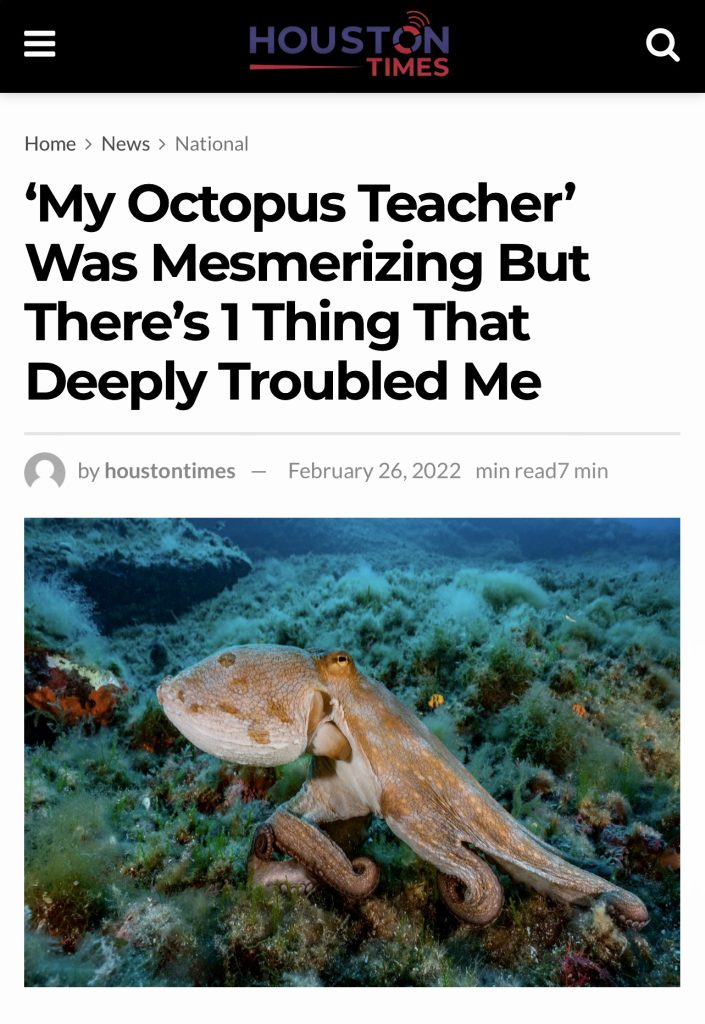🚫✋🐙THANK YOU HUFFPOST PERSONAL and amazing editor, Noah Michelson, for publishing my story! 🚫✋🐙
‘My Octopus Teacher’ Was Mesmerizing But There’s 1 Thing That Deeply Troubled Me
As a dive master, I just couldn’t stop thinking about the potentially dangerous message viewers might take away from the Oscar-winning film.By Lisa Ellen Niver 02/26/2022 09:04am EST

Recently, Jacinta Shackleton, a marine biologist stationed at Australia’s Great Barrier Reef, recorded a blanket octopus (the first one was spotted 21 years ago) while snorkeling. I was excited to see photos of the incredibly elusive creature, but I couldn’t stop thinking about what would have happened if someone who watched “My Octopus Teacher,” last year’s well-deserved Oscar-winning documentary, had discovered it. Would they have approached and tried to touch it?
When I watched “My Octopus Teacher,” about South African filmmaker and conservationist Craig Foster’s yearlong underwater interactions with an octopus, I was mesmerized by the fantastic footage. As a certified dive master and science teacher, however, I am concerned by the message viewers might take away from the film: that anyone can strap on weights, descend deep, and start touching creatures underwater.
I have logged hundreds of underwater hours and I know how rare it is to see an octopus or any other nocturnal sea creature during the day with good enough light to film, let alone see one leave its crevasse and move about freely. Such an experience is certainly worthy of capturing on camera. But as a teacher and human being concerned about our planet, I felt worried.
I fell in love with scuba diving when I was in my 20s and I want as many people as possible to experience the thrill of breathing underwater and witnessing creatures that seem like they could only exist in science fiction. However, I also want people to make good choices.
Foster claims that he was alone while filming, but it appears to me that he had help. If he was alone, that worries me, as scuba diving is exponentially riskier when done solo.
While wearing weights and diving without training or a partner is dangerous, touching the creatures you encounter is even worse. Dive masters are constantly telling people: “Take only photos, leave only bubbles.” My concern is that most people walk away from watching this masterful film with a renewed desire for closeness with nature, but without a sense of what is appropriate for connection with wild animals.

In 1963, the Bronx Zoo had an exhibit called “the Most Dangerous Animal in the World,” and it featured just a mirror. The implication was that human beings can be (and often are) dangerous to the world around them, to each other, and to themselves. We can certainly see this play out underwater.
During one of my many dives in Cozumel, a diver was antagonizing a barracuda. We never dove with him again. His behavior was unsafe for him, for the fish and for all of us around him. If you touch a rockfish, stonefish or lionfish, you may come in contact with their venomous quills or spines, and you can be poisoned. If you accidentally scrape your leg or arm on coral, you may get coral stuck in the wound, and some types of coral are toxic. What’s more, coral is fragile, and touching or standing on it can kill it (unfortunately coral reefs are currently facing many human-caused threats). I have seen people stick their camera and fingers into a coral head or small cave to get a better photo of an eel. If an eel bites you, it cannot release its second set of jaws, called the pharyngeal jaws. Someone will have to kill the eel to remove it from you.
On the street or the beach, if someone’s dog runs up to you, you ask the owner if their pet is friendly. You ask for permission to approach or touch. When I was walking in the Canadian wilderness with tour operator Churchill Wild to see wolves and polar bears, there was a 9-year-old in our group. At one point, he crouched down ― something we had been given specific instructions not to do ― and the wolf closest to us immediately turned toward him. All of the adults quickly moved in front of the child and he stood up. Thankfully, nothing happened to him. It was a frightening and powerful reminder that when we are out of our normal habitat, we humans may not understand ― and therefore abide by ― all the rules, even if we think we know them.
Sometimes humans and wildlife merge and evolve together in unexpected ways. Years ago, many people who fish in Grand Cayman began to clean their catch in one spot and the stingrays around the island came for the free lunch. Now, the area is known as Stingray City, a tourist destination where people can see and swim with many stingrays in one place.
A similar thing happened in Oslob, Cebu, in the Philippines, where the whale sharks were following the fishing boats. People on the boats threw krill in the direction of the sharks and someone saw it on YouTube. Then the tourists came. When I was there, a marine biologist gave us instructions to stay 9 feet from the school bus-sized creatures. However, no one gave this memo to the whale sharks. When humans and wildlife come together ― no matter how beautiful or exciting it may seem ― we still need to remember that these creatures are wild and that we need to respect that, so we don’t hurt them or their habitat (and so we don’t get hurt, either).

Our natural world needs our help. While I believe “My Octopus Teacher” has brought the wonder of the oceans and their creatures to millions of people, I am still troubled by the promotion of the idea that it’s safe to enter the private world of another creature (especially by yourself) and touch it without consent. I’m not claiming that Foster is or ever would suggest that anyone do what he did, but impressionable viewers may not be able to separate his actions from their own, and that could be trouble for everyone involved.
Foster makes clear that his connection with the octopus heals him, and after months of staying at home due to COVID, most of us are searching to renew our relationships with ourselves, each other, and the natural world. But we need to do this with care and caution. We need to put the well-being of these creatures before our own desires. And we need to remember that what happens in a movie ― even a documentary ― isn’t permission to do it ourselves.
I hope that everyone who loved this film will find a way to care for our planet’s ocean environments by supporting the establishment of more marine protected areas, reducing plastic, picking up trash, and being kind to the incredible marine animals and environments we might encounter. Sometimes the best way to be kind to them is to leave them alone ― to be satisfied with the gift of a glimpse of their beauty and nothing more.
As Shackleton recently reminded us, there are many creatures still being discovered and nearly 80% of our underwater world is yet unmapped. I hope this recent sighting of the blanket octopus and “My Octopus Teacher” inspires many others to explore. There are terrific adventures to be found all over our planet, but we need to participate in ways that keep both us and the creatures we encounter safe from harm.
Lisa Ellen Niver is an award-winning travel expert who has explored 101 countries and six continents. Her writing has appeared in Wired, Teen Vogue, Smithsonian Magazine, Ms. Magazine, the Jewish Journal, and many other online and print publications. She is writing a memoir about reinvention after 50. Find her talking travel on Instagram and Twitter at @lisaniver, and on her YouTube channel, which has over 1.5 million views. Read more of her work at lisaniver.com/one-page/.
Do you have a compelling personal story you’d like to see published on HuffPost? Find out what we’re looking for here and send us a pitch!
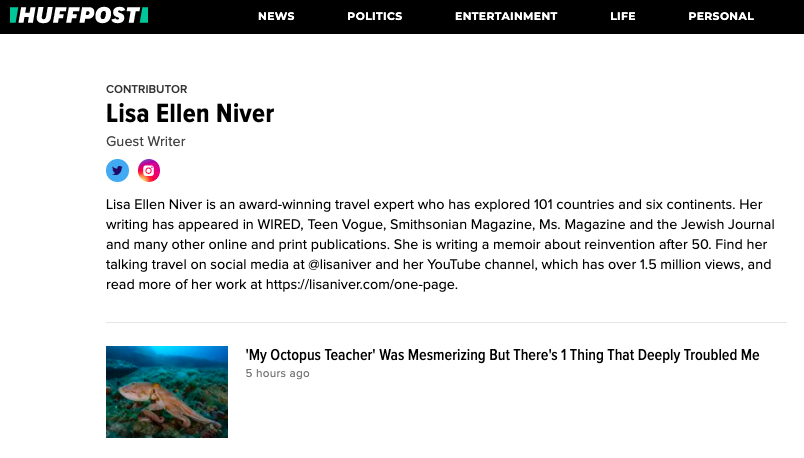
Also seen on: Yahoo News: https://sg.news.yahoo.com/octopus-teacher-mesmerizing-theres-1-140424548.html


Yahoo News: https://www.yahoo.com/entertainment/octopus-teacher-mesmerizing-theres-1-140424548.html

The Baharat Express News: https://www.thebharatexpressnews.com/my-octopus-teacher-was-fascinating-but-there-is-1-thing-that-troubled-me-deeply/

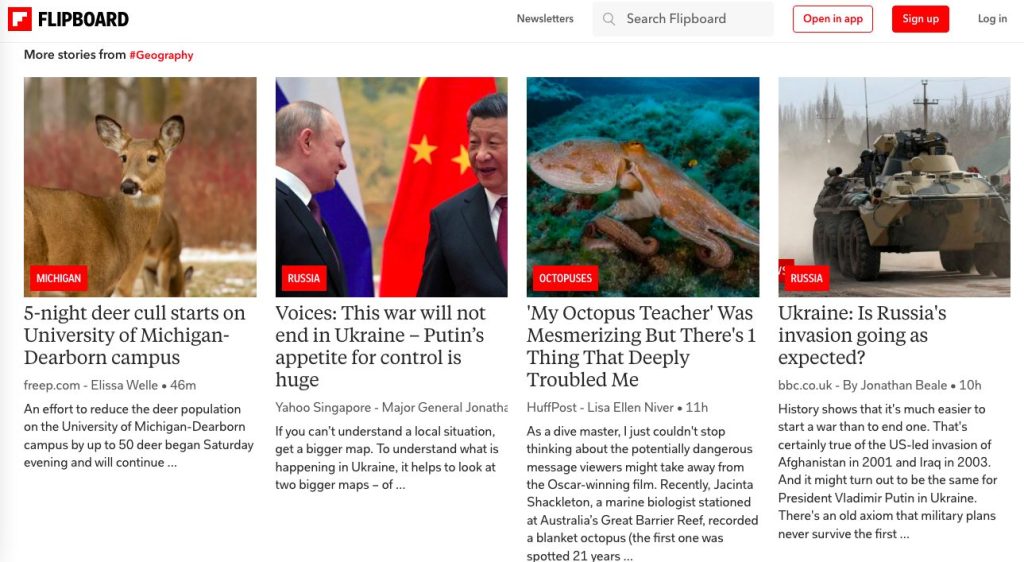
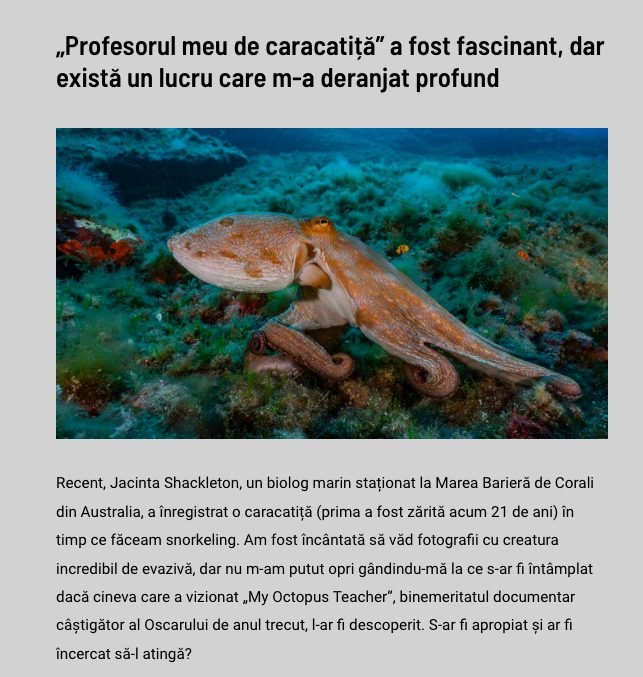

From Latest Breaking News: https://www.latestbreakingnewsvideo.com/news/latest-news/watch-my-octopus-teacher-was-mesmerizing-but-theres-1-thing-that-deeply-troubled-me-huffpost-breaking-news.html

In Spanish: https://espanol.news/my-octopus-teacher-fue-fascinante-pero-hay-una-cosa-que-me-preocupo-profundamente/

In Autos Yahoo: https://autos.yahoo.com/octopus-teacher-mesmerizing-theres-1-140424548.html and in now: https://www.yahoo.com/now/octopus-teacher-mesmerizing-theres-1-140424548.html
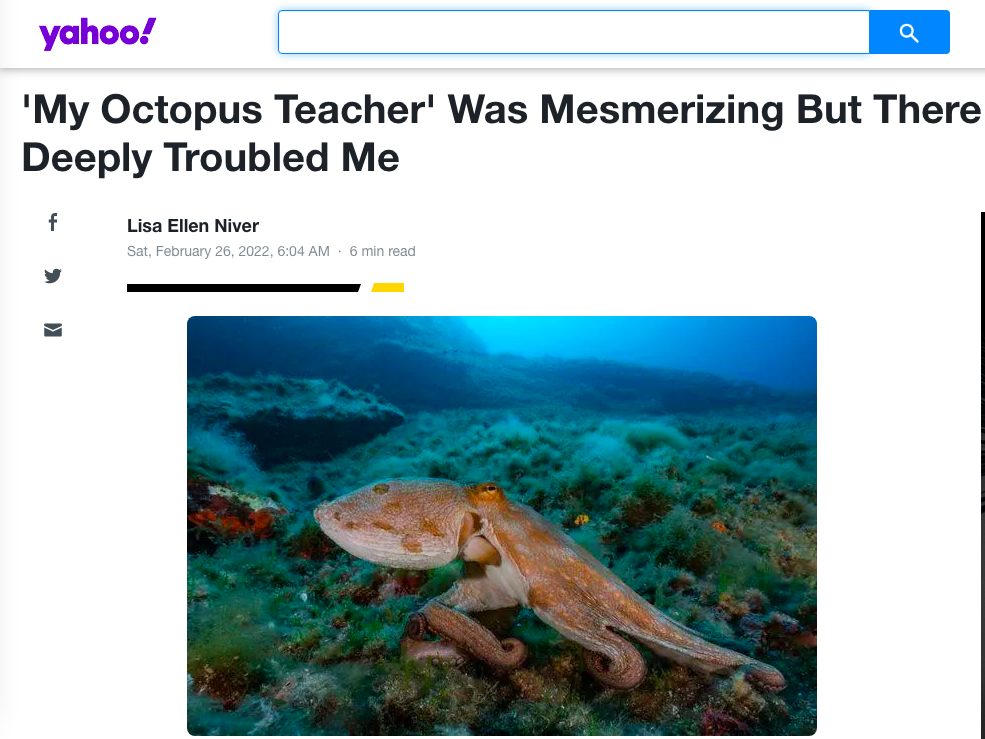
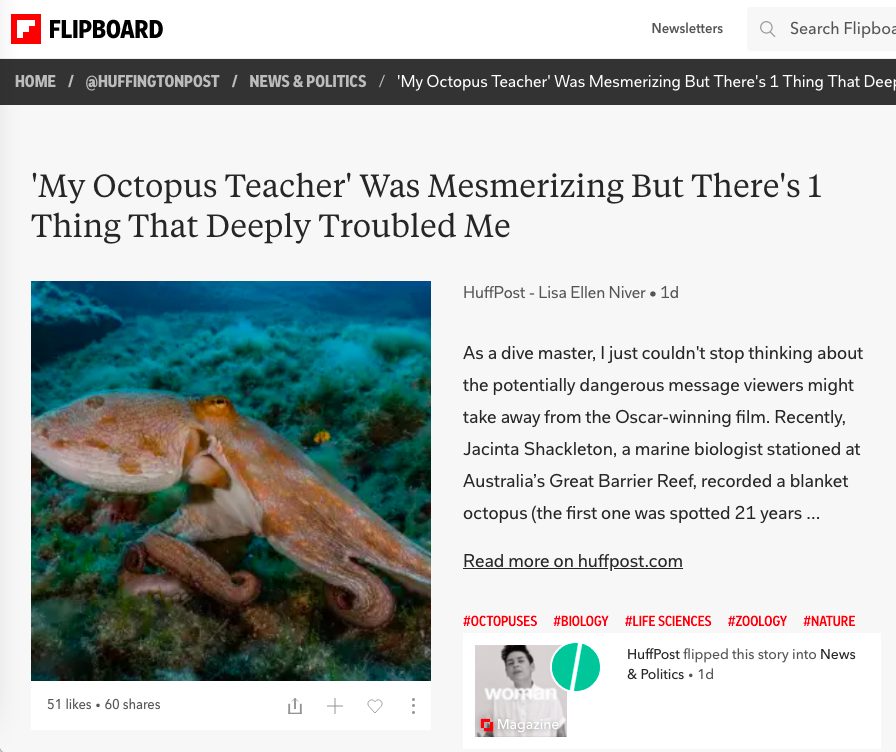
In Pop News: https://popnews247.com/my-octopus-teacher-was-fascinating-but-there-is-one-thing-that-deeply-concerned-me/

Houston Times: https://houston-times.com/my-octopus-teacher-was-mesmerizing-but-theres-1-thing-that-deeply-troubled-me/
